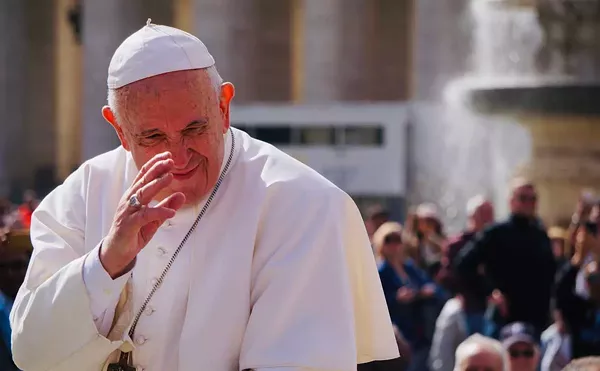
Audio By Carbonatix
[
{
"name": "GPT - Leaderboard - Inline - Content",
"component": "35519556",
"insertPoint": "5th",
"startingPoint": "3",
"requiredCountToDisplay": "3",
"maxInsertions": 100,
"adList": [
{
"adPreset": "LeaderboardInline"
}
]
}
]
The title East Palace, West Palace refers to the two public toilets on either side of the Forbidden Palace which, in contemporary China, are cruising grounds for young gay men. Periodically, they are routed by the police, humiliated in a ritualistic manner (e.g., told to squat and face a wall until their legs hurt), then generally let go with a warning.
During one of these routine raids a young man named A-Lan (Si Han) not only acts with reckless nonchalance toward his tormentors, but impulsively grabs one of the cops and kisses him on the cheek. The policeman is stunned, but does nothing, letting the young man saunter off with insolent grace. We suspect, along with A-Lan, that he has spotted a kindred spirit.
The next time the cop, whose name is Hu Jun (Xiao Shi), encounters A-Lan, he takes him into custody for a night-long interrogation which makes up the heart of the film. A-Lan tells Hu Jun his life story, how he always knew he was gay, about his early encounters, some brutal, some rapturous, some both. Hu Jun responds with disgust and insults but can't stop listening. Slowly A-Lan becomes more human to him and slowly his own homoerotic feelings start to emerge. It's a dangerous unburdening these two men are experiencing, and violence hangs in the air.
Director Zhang Yuan's film had to be smuggled out of China to be shown at Cannes last year and it's a laudable example of outlaw cinema. It's also a very uneven film, seeming at times like a carelessly filmed play, and at others -- especially during flashbacks from A-Lan's life -- a poetic meditation rendered with visual acuity. Si Han gives a charismatic performance as a man tortured both figuratively and literally, but the drama is sluggish and A-Lan's complicated masochism remains, in the end, mysterious.
It's a brave and unsatisfying film.
Richard C. Walls writes about the arts for the Metro Times. E-mail him at letters@metrotimes.com.





